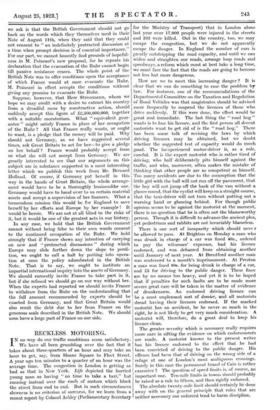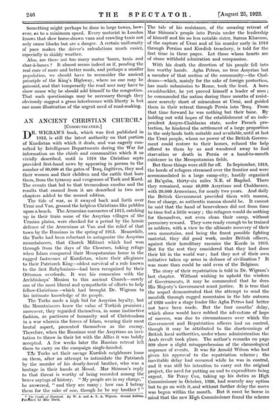RECKLESS MOTORING.
IN no way do our traffic conditions seem satisfactory.
We have all been grumbling over the fact that it takes about three-quarters of an hour and may take an hour to get, say, from Sloane Square to Fleet Street. A year ago ten minutes to a quarter of an hour was the average time. The congestion in London is getting as bad as that in New York. Life depicted the hurried young man as having "no time to take a taxi," but running instead over the roofs of motors which block the street from end to end. But in such circumstances slowness is no criterion of sureness, for we learn from a recent report by Colonel Ashley (Parliamentary Secretary for the Ministry of Transport) that in London alone last year over 17,000 people were injured in the streets and 595 were killed. Out in the country, too, we may escape the congestion, but we do not apparently escape the danger. In England the number of cars is greatly outstripping the road capacity, and until we can widen and straighten our roads, arrange loop roads and speedways, a reform which must at best take a long time, we must face the fact that the roads are going to become not less but more dangerous.
How are we to meet this increasing danger ? It is clear that we can do something to ease the problem by law. For instance, one of the recommendations of the Departmental Committee on the Taxation and Regulation of Road Vehicles was that magistrates should be advised more frequently to suspend the licences of those who drive recklessly. If this were done, the effect would be great and immediate. The last thing the "road hog" wants is to lose his licence, and the first person all decent motorists want to get rid of is the "road hog." There has been some talk of revising the laws by which driving licences may be obtained, but we doubt whether the suggested test of capacity would do much good. The inexperienced motor-driver is, as a rule, careful. It is the expert motorist who is rather tired of driving, who half deliberately pits himself against the traffic, and who, moreover, often makes the mistake of thinking that other people are as competent as himself. Too many accidents are due to the assumption that the little girl with the ball will not run off the pavement, that the boy will not jump off the back of the van without a glance round, that the cyclist will keep on a straight course, that the taxi-driver will not turn without putting out a warning hand or glancing behind. For though public opinion seems to be against the motorist at the moment, there is no question that he is often not the blameworthy person. Though it is difficult to advance the ancient plea, yet pedestrians and rabbits are not invariably blameless.
There is one sort of incapacity which should neve r be allowed to pass. At Brighton on Monday a man who was drunk in charge of a car was fined 40s., ordered to pay the witnesses' expenses, had his licence endorsed, and was debarred from obtaining another until January of next year. At Brentford another man was sentenced to a month's imprisonment. At Preston a man was fined 40s. for being drunk in charge of a car, and XS for driving to the public danger. These fines are by no means too heavy, and yet it is to be hoped that if penalties for such faults are to be made more severe grtat care will be taken in the matter of evidence of drunkenness. An endorsed driving licence can be a most unpleasant sort of dossier, and all motorists dread having their licences endorsed. If the marked motorist has an accident, be he never so much in the right, he is not likely to get very much consideration. A motorist will, therefore, do a great deal to keep his licence clean.
The greater severity which is necessary really requires more care in sifting the evidence on which endorsements are made. A motorist known to the present writer has his licence endorsed to the effect that he had been convicted of driving to the public danger. His offence had been that of driving on the wrong side of a refuge at one of London's most ambiguous crossings. Surely in this case the permanent brand of Cain is rather excessive ? The question of speed limits is, of course, an important one. Ten-mile limits in towns should probably be raised as a rule to fifteen, and then rigidly enforced.
The absolute twenty-mile limit should certainly be done away with on the general principle that rules that are neither necessary nor enforced tend to harm discipline. Something might perhaps be done in large towns, how- ever, as to a minimum speed. Every motorist in London knows that slow horse-drawn vans and crawling taxis not only cause blocks but are a danger. A certain uniformity of pace makes the driver's calculations much easier, especially in skiddy weather.
• Also, are there not too many motor 'buses, taxis and char-i-bancs ? It almost seems indeed as if, pending the real cure of more and better roads, and perhaps a smaller population, we should have to reconsider the ancient principle of the King's Highway, where no one may be gainsaid, and that temporarily the road user may have to show cause why he should add himself to the congestion. That such questionings may be necessary though they obviously suggest a gross interference with liberty is but one more illustration of the urgent need of road-making.



































 Previous page
Previous page